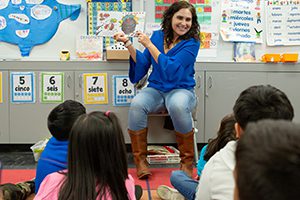Right to Play
When a Norwegian athlete visited war-torn Eritrea, he saw kids tie up a long-sleeved shirt and kick it around because they had no ball. After he won a gold medal in Lillehammer, Johann Olav Koss brought a planeload of balls and other sports equipment. He later said that he confessed to the president of Eritrea that he felt foolish he had not brought food and other necessities but only play equipment. But, according to the story, the president replied, “This is the greatest gift we have ever received. For the first time, we are being treated like human beings — not just something to be kept alive. For the first time, my children can play like any child.”
It isn’t fair, of course, to compare Nogales, Ariz., to Eritrea in the mid-1990s. Nowhere in the United States is comparable. But the fact is that Nogales can be a pretty grim place. When I visited in the spring, the principal of Wade Carpenter Middle School, Liza Montiel, drove me through some of the neighborhoods her students come from. Some live in tidy little one-family homes, some in crowded, dusty trailer parks, and some in places that show the signs of the decades-long drug war that has been conducted along the border of Mexico and Arizona — places that look abandoned or blown apart.
I didn’t see a lot of Little League fields.
But I did see playing fields at the middle school, and I was there for “field day” during which every kid was required to play in the kickball tournament, even those who shyly hung back. “Some of our kids don’t know how to play,” Montiel told me. “They don’t know how to kick a ball, they don’t know how to run the bases. We need to teach them.”
We have asked educators in this country to take on a big job — to educate all our kids. There are educators out there — as I write about in the Huffington Post this week — who are not only willing to take that on, but also think broadly about what that means. They know that kids who may have serious family responsibilities at home are the same kids who need to learn algebra and what happened in World War I, but they are also the same kids who need to play and have fun.
I don’t mean to repeat myself, but we could all learn a lot from Wade Carpenter.
(And if you want to learn more about the organization Right to Play, which grew from Johann Olav Koss’ experience in Eritrea, visit the site.)





